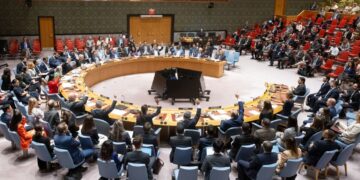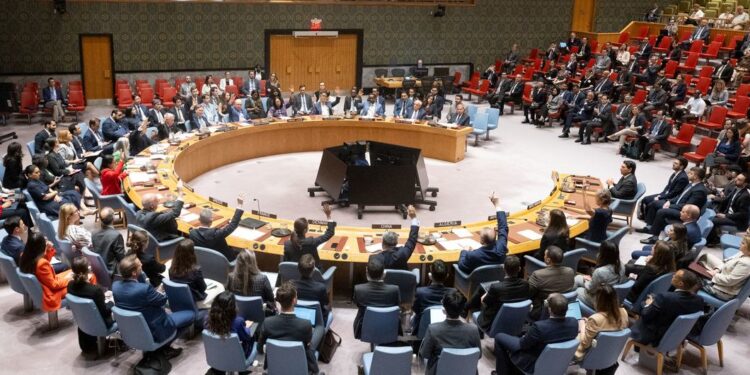New York — A draft resolution calling for an immediate, unconditional, and permanent ceasefire in Gaza failed to pass in the United Nations Security Council on Wednesday after the United States cast the lone veto, despite overwhelming support from all other members, including three African nations: Sierra Leone, Somalia, and Algeria.
The resolution, co-sponsored by all ten elected members of the Council (collectively known as the E-10), received 14 votes in favour and one against from the U.S., a permanent member with veto power. This blocked the resolution from being adopted, despite broad international backing.
African Support for Peace in Gaza
The three African members of the Council — Sierra Leone, Somalia, and Algeria — co-sponsored the resolution, joining Denmark, Greece, Guyana, Pakistan, Panama, the Republic of Korea, and Slovenia in a unified call for peace. Their votes reflected Africa’s growing voice in global peace and security matters and a shared concern for the deepening humanitarian catastrophe in Gaza.
Had it passed, the resolution would have demanded a full and permanent ceasefire, called for the unconditional release of hostages, the lifting of all restrictions on humanitarian aid, and urged restoration of essential services in line with humanitarian principles and international law.
The text also backed ongoing mediation efforts by Egypt, Qatar, and the United States, aligned with Security Council Resolution 2735 (2024), which outlines a phased ceasefire, release of hostages, withdrawal of Israeli forces, and the beginning of Gaza’s long-term reconstruction.
U.S. Blocks Consensus
Speaking before the vote, Acting U.S. Representative Dorothy Shea said the draft was “unacceptable” both in content and process. She criticised it for failing to explicitly condemn Hamas and for not demanding its disarmament and withdrawal from Gaza.
“The United States has been clear: we will not support any resolution that ignores Hamas’ role or allows it to remain in Gaza,” she said. “This resolution undermines the ceasefire framework already proposed and would reward Hamas for its intransigence.”
Deepening Crisis, Global Outcry
UN agencies and humanitarian groups have continued to warn of a collapsing humanitarian situation in Gaza, exacerbated by ongoing conflict, an aid blockade, and destruction of health and essential services infrastructure. Recent reports from international food security experts highlight widespread hunger and famine risk.
“The world is watching horrifying scenes of Palestinians being shot, wounded, or killed in Gaza simply while trying to find food,” said UN humanitarian chief Tom Fletcher, warning of further collapse if access restrictions persist.
Criticism has also been levelled at a new U.S.- and Israel-led aid distribution system, which bypasses established UN channels and has reportedly faced operational delays and inequities in reaching affected populations.
African Leaders Call for Justice and Accountability
African members of the Council have repeatedly emphasised the need for a rules-based international order, calling on all parties to respect international humanitarian law and avoid targeting civilians. Their support for the failed resolution reflects a consistent position in favour of peaceful resolution, accountability, and human dignity.
The failure of the resolution underscores ongoing divisions within the Security Council and raises renewed concerns about veto power undermining the will of the international community, particularly when it comes to life-or-death humanitarian crises.
As the death toll mounts and millions of Gazans remain displaced, African voices continue to stand at the forefront of calls for a just and lasting peace, urging the international community not to turn away.











